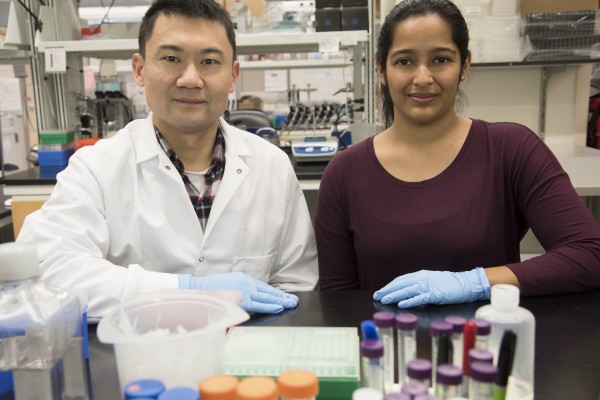The human eye can see ‘invisible’ infrared light
Science textbooks say we can’t see infrared light. Like X-rays and radio waves, infrared light waves are longer than the light waves in the visual spectrum. But an international team of researchers co-led by Frans Vinberg, PhD, (left) and Vladimir J. Kefalov, PhD, has found that under certain conditions, the retina can sense infrared light after all.
Vaccines may make war on cancer personal
In the near future, physicians may treat some cancer
patients with personalized vaccines that spur their immune systems to
attack malignant tumors. New research led by scientists at the School of Medicine including senior author Robert Schreiber, PhD, has brought the approach one
step closer to reality.
Finding features that support exercise in workplace neighborhoods
Neighborhood features such as bike facilities and low
crime rates are associated with increased leisure and workplace-related
physical activity, according to a new study from the Prevention Research Center at Washington University in St. Louis.
Protein that rouses the brain from sleep may be target for Alzheimer’s prevention
A protein that stimulates the brain to awaken from
sleep may be a target for preventing Alzheimer’s disease, a study by School of Medicine researchers suggests. David M. Holtzman, MD, head of the Department of Neurology, is the study’s senior author.
Three WUSTL faculty named AAAS fellows
Three faculty members at Washington University in St. Louis have been named fellows of the American Association for the Advancement of Science (AAAS), the world’s largest general scientific society. They are Mary C. Dinauer, MD, PhD, David M. Holtzman, MD, and Robert G. Kranz, PhD.
Muscle relaxant may be viable treatment for rare form of diabetes
A research team led by Washington University endocrinologist Fumihiko Urano, MD, PhD, (right) and first author Simin Lu, PhD student, (left) has discovered that a commonly prescribed muscle relaxant may be an effective treatment for Wolfram syndrome, a rare but devastating form of diabetes.
Hawkins named chief of hepatobiliary-pancreatic and GI surgery
William Hawkins, MD, a noted pancreatic cancer surgeon, has been named chief of the Section of Hepatobiliary-Pancreatic and Gastrointestinal Surgery, and the Neidorff Family and Robert C. Packman Professor at the School of Medicine.
Damage to brain networks affects stroke recovery
Initial results of an innovative study may significantly change how some patients are evaluated after a stroke, according to School of Medicine researchers. Shown is the study’s senior author, Maurizio Corbetta, MD.
Exploring the genomes of mice and men
New research by Ting Wang, PhD, (left) and graduate student Vasavi Sundaram has uncovered some striking differences in the genomes of humans and mice that can help scientists determine when a mouse may be a good stand-in to study human biology and disease.
Wall recognized for work at Ethiopian university
L. Lewis Wall, MD, DPhil (right), has received a gold medal for his “meritorius contributions” to medical education at Mekelle University College of Medical and Health Sciences in Mekelle, Ethiopia. He is a professor of obstetrics and gynecology at the Washington University School of Medicine and of anthropology in Arts & Sciences.
Older Stories

